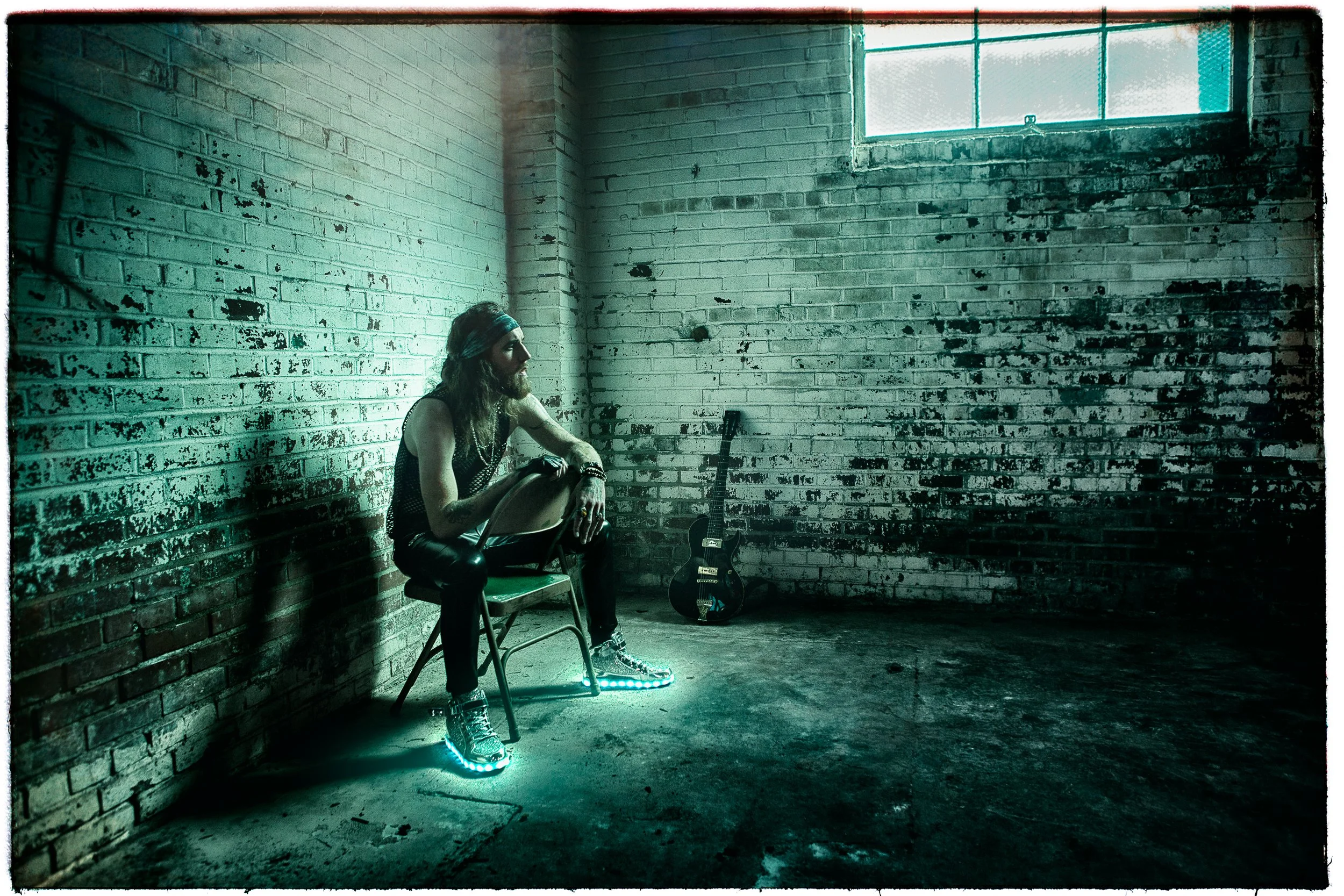Click Image to Download!
When Alex Williams debuted with 2017's Better Than Myself, his big, booming baritone and southern storytelling seemed to channel the country outlaws who came before him. The album made him a hero of modern-day American roots music, and when he returned in 2022, it was with Waging Peace, an eclectic and reflective record that showcased just how broad his definition of Americana could be.
Williams widens that sound once again with Space Brain. Inspired by his longtime love of 1980s metal, it's an unexpected covers album that looks far beyond the typical kingpins of country music for inspiration. You won't find any Willie Nelson anthems, George Jones ballads, or Waylon Jennings classics here. Instead, Space Brain trades honky-tonk heroes for hard-rocking hell-raisers, with Williams putting his own spin on songs originally recorded by Judas Priest, Cinderella, Motley Crue, and others. The result is a wildly diverse and surprisingly moving tribute to the music that shaped his childhood, laying the foundation for a career that's found him challenging the status quo ever since.
"My dad got me into '80s metal," says the Indiana native. "When I was 11 years old, he had a collection of Skid Row, Cinderella, and Motley Crue CDs that I would pick through. When I was a teenager, he'd take me to concerts by Motley, Poison, and Ratt. It was the music that I grew up loving, and I've loved it ever since."
For a small-town teen raised in the Rust Belt, those bands gave Williams a glimpse of a life that seemed to exist somewhere beyond the Indiana state line. Even his favorite childhood video game, Grand Theft Auto: Vice City, featured music from the era. He was drawn to it all: the nighttime indulgence of Ratt's "Round and Round," the relentless chug of Judas Priest's "You've Got Another Thing Coming," the humor and hard-edged guitar riffs of David Lee Roth's "Yankee Rose." Years later, even after records like Willie Nelson’s Red Headed Stranger inspired him to launch a critically lauded career as a country songwriter, those metal roots remained.
Arriving on the heels of two albums fueled by Telecaster twang, earthy acoustics, and folky songwriting, Space Brain doesn't push Williams away from his country pedigree. Instead, it expands his interpretation of that sound altogether. Singing with a husky, deep-seated voice and backed by a band of Nashville-area heavyweights, Space Brain finds him reinterpreting his heavy metal favorites as a collection of backwoods ballads, campfire sing-alongs, and roadhouse roots-rockers. "Nobody's Fool" — Cinderella's glammy power ballad from 1986 — is stripped down to its foundation and rebuilt as a mid-tempo meditation on a messy breakup, with a cameo from Cinderella frontman Tom Keifer himself. Guns N' Roses' "Night Train" opens with shimmering acoustics before gathering speed and culminating in an ethereal mix of pedal steel, driving percussion, and baritone guitar. Guest singer Cody Jinks swaps vocals with Williams on Ozzy Osbourne's "Flying High Again," while drummer Fred Eltringham (Sheryl Crow, The Chicks, Lainey Wilson) pushes the song forward at a swampy, southern lope. Space Brain is rounded out by country-inspired renditions of Skid Row's "Youth Gone Wild," Poison's "Look What The Cat Dragged In," Tesla's "Gettin’ Better," Motley Crue's "Wild Side," and Motörhead's "Ace of Spades," all performed with new arrangements that emphasize storytelling over sheer sonic stomp. Heavy metal and country music may seem like strange bedfellows at first glance, but there's a real reverence for the material here, with Williams breathing new life into his source material.
To record Space Brain, Williams teamed up with longtime producer Ben Fowler and returned to Nashville. He'd first moved to town as a college student, pursuing a songwriting degree at Belmont University before trading his music classes for a different sort of education: the trial-by-fire experience of playing nightly gigs on Nashville's Lower Broadway circuit. All of those hours spent onstage — not only in Nashville, but also in venues across North America and beyond — helped prep him for Space Brain's fast-and-furious tracking process. "We recorded most of the songs in just two days," he remembers. Working with a hotshot band — including modern-day guitar heroes like Rob McNelley (Bob Seger, Wynonna Judd), Dan Dugmore (Linda Ronstadt, ZZ Top), and Mike Payne (Luke Bryan) — Williams approached Space Brain's songs from different angles. He lowered their keys. He changed their grooves. He replaced electric guitar riffs with acoustic arpeggios and Dobro solos. The goal, he said, was to showcase the actual craft that existed beneath all that dazzling fretwork and loud, larger-than-life arrangements.
"I wanted to strip things back and come up with alternate versions of these songs," he says. "More importantly, I wanted to bring it back to the song itself. Lyrics and melody can get a little lost when there's a loud band playing the material, but there are some great songs underneath all the noise. I wanted to strip it back a little bit and highlight what these songs are saying."
The result is a record that positions Alex Williams not only as a vocalist with Stapleton-sized swagger and Waylon-worthy power, but as an interpreter, too. Country music has a long history of honoring its pioneers, with countless artists offering up their own versions of the genre's greatest hits. Space Brain is something different: a country album that nods to a different genre altogether. Few artists would venture this far outside the realm of American roots music, but Williams has never minded taking an unconventional path. That's what makes him so compelling.
"I didn't record these songs to make a statement, or to tell people I'm different," he says. "This album is just an extension of my story. I grew up on '80s hair metal, and that music is still in my DNA. I'm always trying to make albums that represent where I'm at and what I'm feeling, but I've never had any sort of game plan. I didn't set out to become an outlaw country artist. I'm just doing whatever feels right in the current moment… and right now, this '80s metal album just feels right."
Williams has no interest in following the music industry playbook. He's just trying to follow his inner compass and honor his roots. With Space Brain, he plants his flag outside the mainstream, daring his audience to follow. And, in doing so, he's never sounded more like an outlaw.








